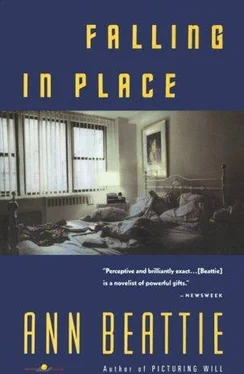Ann Beattie - Falling in Place
Здесь есть возможность читать онлайн «Ann Beattie - Falling in Place» весь текст электронной книги совершенно бесплатно (целиком полную версию без сокращений). В некоторых случаях можно слушать аудио, скачать через торрент в формате fb2 и присутствует краткое содержание. Год выпуска: 1991, Издательство: Vintage, Жанр: Современная проза, на английском языке. Описание произведения, (предисловие) а так же отзывы посетителей доступны на портале библиотеки ЛибКат.
- Название:Falling in Place
- Автор:
- Издательство:Vintage
- Жанр:
- Год:1991
- ISBN:нет данных
- Рейтинг книги:4 / 5. Голосов: 1
-
Избранное:Добавить в избранное
- Отзывы:
-
Ваша оценка:
- 80
- 1
- 2
- 3
- 4
- 5
Falling in Place: краткое содержание, описание и аннотация
Предлагаем к чтению аннотацию, описание, краткое содержание или предисловие (зависит от того, что написал сам автор книги «Falling in Place»). Если вы не нашли необходимую информацию о книге — напишите в комментариях, мы постараемся отыскать её.
Falling in Place — читать онлайн бесплатно полную книгу (весь текст) целиком
Ниже представлен текст книги, разбитый по страницам. Система сохранения места последней прочитанной страницы, позволяет с удобством читать онлайн бесплатно книгу «Falling in Place», без необходимости каждый раз заново искать на чём Вы остановились. Поставьте закладку, и сможете в любой момент перейти на страницу, на которой закончили чтение.
Интервал:
Закладка:
“She was a bitch,” John Joel had said, when John went into his hospital room. He was in bed, and he looked tired. Fat and pale and tired, the way any ten-year-old would look at midnight. “He doesn’t know what he’s talking about,” John had said to the nurse who stood in the room. He had not been able to say it to John Joel. He had turned and said it to the nurse. The nurse had acted as if he hadn’t spoken. She might as well have been a paper cutout of a nurse. She just stood and looked blank-faced. She was all in white, and his son was all in white. He could think of nothing but Mary’s blouse, the blouse that Louise was holding outside the operating room when he got to the hospital, the blouse that they were trying to pry away from her, saying, “She’s alive. She’ll be fine.” They wanted the blouse, and Louise wasn’t giving it to them. “We need that,” they said, and another person tugged. Louise held on to it .
In the room, he had hugged John Joel. He had heard his son’s breathing, and his own breathing, and he realized that his breath was coming fast and hard, and his son’s breathing was the calm breathing of near-sleep, that he was squeezing and not getting squeezed in return .
He had been going to take Brandt to a Little League game .
His mother had told him to get an air conditioner for his car. He had wished for an air conditioner for his car. That was something he had thought about, a few hours before — being cool in his car .
He had said that he could drive home with no problem, and he had been lying. He wanted to tell them that he couldn’t, but he had found himself saying that he had driven there, and of course he could drive back. The young cop offered two times to drive him. “You could get your car in the morning” the young cop had said, and his partner had said, “He knows that,” as he tried to nudge the young cop along. “I didn’t know that,” John had said. What he meant was that he hadn’t thought about it. “You what?” the cop said. The young cop looked back at him. “Ride?” the young cop said. He had raised his hand, then had no idea why he had done it. He had waved to the cops. “Nothing,” he had said. He and Louise had ridden to the lobby with the cops, and then the cops had turned and gone one way, and he and Louise had gone another. He was trying to think of the fastest route home, and he couldn’t visualize any of it; he couldn’t even remember one way to get home. But when he got out on the road — he drove by sight, not by road signs, anyway — he would remember instantly. He wanted to remember instantly. He wanted to be home, but he was not sure if he could drive there. For a second, the older cop’s face had blurred and he had thought that it wasn’t a face at all, but a scarab. Then the lines had hardened into features again .
Tiffy and her husband were in the house. When they came in, Tiffy’s husband rose to greet them, as if they were visitors. Tiffy just sat and stared. Her husband asked if he wanted them to go. He wanted them to go. “No,” he said. “Sit down,” Tiffy’s husband said. They sat down. Tiffy got up and put her arm around Louise’s shoulder. “You were right,” Louise said to Tiffy. “It was a shot.” “Everything’s all right,” Tiffy said. “I called the hospital. They said you were coming home. We didn’t know if we should go or stay. Do you want us to sleep in the living room? Just so we can answer the phone or something?” Louise looked at John. “That’s very nice of you,” he said. He was thinking: I was at work today. I worked, and I drove back to Connecticut, and Mary and John Joel are in the hospital, and he did it because she was a bitch. He said she was a bitch. It was true that someone could dress very conventionally and still be evil: Nixon with his jacket and tie walking on the beach, for example. But Mary — Gingerbread Mary — a bitch? He wondered what his son had meant by that .
Tiffy and Louise had gone upstairs. He had heard Louise crying, and Tiffy talking. He hardly knew Tiffy’s husband, and didn’t know what to say to him. They sat there awkwardly for a while, and then Tiffy’s husband said that he thought he would take a walk — did he want to come? He said no. He thought that if he went out to walk, he would start running. He was afraid that he would run until he died. He had been so frightened, watching them swabbing Louise’s arm. He had thought: It’s not to calm her — they’re tricking us. “Is this what you want?” he had said to Louise, but the needle was already in her arm. The doctor turned and glared at him. Then the piece of cotton in place, the nurse clamping her finger over it and pushing Louise down into a chair. She sat very still in the chair, and didn’t seem to care that she was being stared at. She didn’t really seem to notice that he was there, either. She noticed when he walked in, but then she didn’t seem to notice him. In the car, she sat with her knees drawn up, hands clasped around them. He had tried to take her hand, but she wouldn’t let go. He had put his hand over her hands, steered with one hand. He had found the way home, and now he did not want to go out walking. He thought about calling his mother, Nick, Nina. He couldn’t imagine what he would say. And then he had fallen asleep. He woke up and saw that an hour had passed. He heard Tiffy, still upstairs, still talking. Her husband had not come back. He began to pace the house. He went out to the kitchen and opened the back door. Insects were chirping. Moths came from nowhere and flapped past him, into the bright room. He looked at the tree, at the back of the yard, remembered lifting the robin’s egg, gently, from the grass: the fragile egg, safe in a dish in Nina’s apartment. John Joel had shot Mary from up in that tree, the same tree where the robins had built their nest, the same tree he had voluntarily vacated until the birds were gone. The tree he watched, and kept the neighbor’s fat orange cat away from. He closed the door and went to the kitchen table and sat down. Dishes were pushed to one side, and the day’s mail, full of bills and advertisements, was on the table, too, and as he flipped through, he found it. He found it and knew instantly why she had called him. It was a travel brochure on Nantucket, and there was a petition—“Petition for Nantucket Vacation” was written across the top of a piece of paper — signed by Louise and John Joel and Mary. They were asking to be taken to Nantucket. That was what it was all about. The idea of packing bathing suits and going to Nantucket seemed more grotesque to him than setting off with snowshoes for Alaska. He put the brochure down, as shocked as if he had found a letter to Louise from a lover. That was what she had called him about .
Then he drove. He meant to drive for a while and go back to the house, but he got lost, and then he found the Merritt Parkway, and it seemed more logical to go than to stay. He was speeding, watching the needle climb. And when he looked at the road again he realized where he was, how close to New York he was getting, and he pushed hard on the accelerator. There was too much wind at such a high speed, so he put his window halfway up. He was going to keep driving for a while, and then go back. He knew he wasn’t. He looked at his watch and wondered where so many hours had gone. He must have looked at the clock in the house wrong, or maybe his watch was wrong. A van with a plastic flower on the aerial passed him. A Honda Civic passed him. He was amazed that he was driving so slowly. He looked at the needle and saw that he was going thirty. He pushed hard, watched the needle climb to forty, fifty, sixty. He held it at sixty, watching the sky gradually lighten .
And then he was in New York, and the light was even, and he didn’t know what to do but start the usual routine. He took the car to the garage, he walked up the cement ramp to the street, and walked for miles before he thought to hail a cab. “Some son of a bitch threw up after I picked him up at Studio 54,” the driver said. “I hope it doesn’t still stink back there.”
Читать дальшеИнтервал:
Закладка:
Похожие книги на «Falling in Place»
Представляем Вашему вниманию похожие книги на «Falling in Place» списком для выбора. Мы отобрали схожую по названию и смыслу литературу в надежде предоставить читателям больше вариантов отыскать новые, интересные, ещё непрочитанные произведения.
Обсуждение, отзывы о книге «Falling in Place» и просто собственные мнения читателей. Оставьте ваши комментарии, напишите, что Вы думаете о произведении, его смысле или главных героях. Укажите что конкретно понравилось, а что нет, и почему Вы так считаете.












